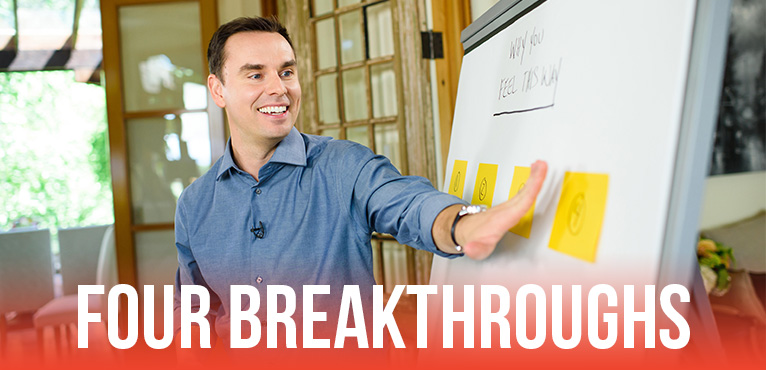SUMMARY
- “Leadership’s fundamental principle is that people support what they create.”
- Are you seeking to strengthen your leadership skills and foster a more collaborative team culture? In this episode, learn the 4 key skills you need to develop more effective leadership!
- “Active participation and enrollment of conversation is the difference maker and your job as a leader is to hold that space, to set the standard, the expectation, the structure for that space for other people to participate.”
- Looking to be a better leader for your team, your family, your community? Let this episode be a tool to guide you to a better understanding of your team and their motivation behind their work!
- Watch the video to get the full training.
- Already have the High Performance Planner and CRUSHING each and every day? Let’s celebrate you! Take a photo with your planner and use #GrowthDay so we can find you on social media!
HOT NEWS & DEALS!
-
Get the High Performance System!
If you want to level up personally and professionally, High Performance System is the resource you need. The High Performance System will guide you through developing and implementing the 6 science-backed habits that will move the needle from ordinary to extraordinary. Develop the habits that lead to long-term success, positive relationships, and healthy well-being! Get the High Performance System!
-
Get the GrowthDay app!
Make self-improvement a way of life and get the GrowthDay app! GrowthDay features all your personal development tools, coaching and community in one place. Write your journal, track your habits, take wellness challenges, watch live influencers teaching new life strategies, and join a global community of positive and supportive high achievers excited to improve their lives! Get the app on Apple app store here. Get on Android here. Get desktop here.
DID YOU KNOW?
I give weekly prizes, gratitude and shout-outs to our students, so post a screenshot or video on Instagram and use #TheBrendonShow! I can’t wait to hear your thoughts about this episode!
RELATED POSTS
The 2 Best Tools in Your Leadership Toolkit
5 Must-Do Practices For Great Leaders
3 Ways to Communicate Mindfully
How to Become a Better Communicator
Advice to Human Resource and Learning and Development Leaders





FULL TRANSCRIPT
[The following is the full transcript of this episode of The Brendon Show. Please note that this episode, like all TBS episodes, features Brendon speaking extemporaneously–he is unscripted and unedited. Filmed in one take, The Brendon Show has become one of the most viewed unscripted, direct-to-camera self-help series in the history of YouTube. It has also been the #1 Podcast in all of iTunes and is regularly in the top podcasts in Self-Help and Health categories around the globe. Subscribe to the free motivational podcast on iTunes or Stitcher.)
My biggest belief, my biggest teaching in all of leadership is five simple words. People support what they create. People support what they create. This is the defining leadership principle of my life.
Every time I’m working with a leader and they’re frustrated with their coworker, they can’t get the team to be motivated and energized, the downline isn’t performing, the upline isn’t listening. We’ve got this problem where you can’t mobilize a movement or you started a political action committee and it didn’t stick. Or you started your nonprofit and no one contributed. It always comes down to a fundamental misperception about this topic of leadership.
Leadership’s fundamental principle is that people support what they create.
1. Reward People For Following You
If you want people to follow you, they must create with you. They must feel enabled, trusted, empowered, autonomous, capable, and rewarded for participating in the journey, in what we’ll call the vision today. If they don’t have any hand in shaping it, and if they have no reward, autonomy or trust in participating in it, they’ve got no skin in the game. They’ve got no reason to be enthusiastic, excited, hardworking, excellent. So what happens?
Well, as you see around the world it is like we have these command and control old models from the past. These dictatorial ways of leading where it was like, do this, do this, do this, very like early 1800, stuff that should have been done by the 1950s, but people are still learning. And so you have this situation where a lot of people still think they have positional leadership. They think, “I’m the boss or I’m this leader, everyone needs to only do these things”, and it becomes a one-way street. Or it becomes something where the leader doesn’t have the connection with everybody else because no one has a part in it. They can’t play yet. They don’t believe in it yet. Even if they like you, even if they think you’re an okay person, even if you had great successes in the past— if you don’t get them collaborating to create where we’re going, how we’re going there and how we’ll be together, they’re not interested. They’ll pretend, they’ll take the paycheck, but they’ll be gone in six months. Or when tough times hit or the stock price goes down, they’re bailing, man, because they’re thinking, “You know what? I’m not part of this. I’m not part of this.”
2. Create A Participatory Space
I’m telling you, we live in a participative global culture now where people want a voice. And so much of leadership is understanding where to open conversations to allow diverse voices to come in and have a perspective on something, even if you or the leaders maintain that decision-making authority, which we’ll talk about later.
The active participation and enrollment of conversation is the difference maker and your job as a leader is to hold that space, to set the standard, the expectation, the structure for that space for other people to participate.
Now I know, some of the leaders out there are like, “Yeah, but that’s super hard that the timing of that and when, and some people have a voice, but they don’t know what the hell they’re talking about. They’re not an expert Brendon, why would I listen to them? And oh my gosh, does it mean more meetings for me?” Don’t worry, this isn’t about you doing more meetings just to listen casually. We’ll get to those practices later, the principle I want you to write down, people support what they create, the five most important words in all of leadership, people support what they create. If you get that principle, we can change the world. When you don’t get that principle, you don’t get followers.
3. Reframe How You Think About Your Community
Now, with that, I want to introduce a concept that I’ve literally been teaching for 21 years now. I don’t like the word “followers”. I don’t like the word leaders versus followers. If you studied with me before, you know that instead of followers, you have collaborators. It’s just a different way of defining things. Unfortunately in our world because of popularity and ego, when someone follows you on the internet, it all becomes a one-way street. And so now we’ve ingrained in people’s human behavior this idea that I broadcast my world, and you should follow it. That’s coming to organizations. I tell you what to do, and you should follow it. Versus, “Hey, we’re co-creating this organization together. We’re co-creating this team.” You’re going to have some people on your team who are super participated and other people, they were never given autonomy or trust or a voice, and they’re super smart, but you’re not getting enough from them. They just need to be enrolled to participate in a different way than the person who’s always had the benefit of being in communities where they were heard.
We live in a world right now where so many people have never actually been heard. Then we expect them to perform as high performers in their organizational settings. It’s like, “Oh, you have to be aware of these things.” Some members of your team and some members of your family haven’t been heard, haven’t felt heard, haven’t been allowed space for it. And I don’t just mean listen to, I mean, being allowed space to make decisions together about what’s important.
4. Create Opportunities For Ownership
Take a look at the most critical members of your team. Maybe this is your executive team or the most important people in your life, your family — look at each of them individually through this lens. It’s like, “Oh, has this person been co-creating the experience with me? Have they been active in that or passive in that?” And not as a judgment to them like, oh one they’re bad, it’s that, oh, as a leader, you need to create a process, a rhythm, a meeting, an opportunity for this person to get some decision-making authority, to establish some trust, to if anything, to be heard more in meetings. Maybe this person is never called on. They never get the opportunity and you’re going like, “Oh, I’m going to be aware, this person has not been participating and I need that participation from them if we’re going to have long-term success and we need to participate together, so let me have that.”
So I’m always thinking about that and when I work with leaders and I coach them in performance, it’s always about, okay, let’s work through your team, let’s walk through this principle. And let’s talk about each of these critical team members. And do they feel empowered to be part of the process?
Because people who support what they create, that means ultimately people being part of the process, because guess what? When they’re part of the process, they help come up with decisions. They’re working towards something they had a hand in, they fight for it. They stay focused on it. They have ego and decision-making in that process and they want to protect it.
When someone has an idea, you know what they want to do? They want to own that. They want to protect that. They want to perpetuate that, they want to ensure that that idea lives. When people are allowed to participate, better ideas come up, people have more buy-in, people stay committed over the long term. Humans become more resilient themselves, it’s important. It’s so important.
So please, take an active role in the state. Score yourself, be honest and think about this and how you can amplify this. If all you do is understand this principle and you practice this principle at the deepest levels, you would so far surpass almost everybody you’re working with, I promise.
